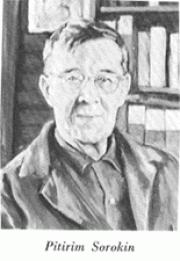By John S. Uebersax
• Pitirim Sorokin, a leading 20th century sociologist, is someone you should know about.
Consider this quote of his:
The organism of the Western society and culture seems to be undergoing one of the deepest and most significant crises of its life. The crisis is far greater than the ordinary; its depth is unfathomable, its end not yet in sight, and the whole of the Western society is involved in it.
It is the crisis of a Sensate culture, now in its overripe stage, the culture that has dominated the Western World during the last five centuries…
Via wordpress.com
Shall we wonder, therefore, that if many do not apprehend clearly what is happening, they have at least a vague feeling that the issue is not merely that of “prosperity,” or “democracy,” or “capitalism,” or the like, but involves the whole contemporary culture, society, and man? …

Shall we wonder, also, at the endless multitude of incessant major and minor crises that have been rolling over us, like ocean waves, during recent decades? Today in one form, tomorrow in another. Now here, now there. Crises political, agricultural, commercial, and industrial! Crises of production and distribution. Crises moral, juridical, religious,
scientific, and artistic. Crises of property, of the State, of the family, of industrial enterprise… Each of the crises has battered our nerves and minds, each has shaken the very foundations of our culture and society, and each has left behind a legion of derelicts and victims. And alas! The end is not in view. Each of these crises has been, as it were, a movement in a great terrifying symphony, and each has been remarkable for its magnitude and intensity. (P. Sorokin, SCD, pp. 622-623)
Pitirim Alexandrovich Sorokin (1889–1968) was born in Russia to a Russian father and an indigenous (Komi, an ethnic group related to Finns) mother. Like other intellectuals of his age, he was swept up in the revolt against the tsarist government. He held a cabinet post in the short-lived Russian Provisional Government (1917), and had the distinction of being imprisoned successively by both tsarist and Bolshevist factions.
Eventually sentenced to death, he was pardoned by Lenin, emigrated, and came to the US. There he enjoyed a long and distinguished academic career, much of it at Harvard University, where he served as head of the sociology department.
His experience and acute observations of Russian politics left him uniquely suited for understanding the transformational forces of the 20th century. By 1937 he published the first three volumes of his masterpiece, Social and Cultural Dynamics, but he continued to refine his theories for nearly three more decades.
Based on a careful study of world history – including detailed statistical analysis of phases in art, architecture, literature, economics, philosophy, science, and warfare – he identified three strikingly consistent phenomena:
Main characteristics of the Sensate, Ideational, and Idealistic cultural patterns are listed below. (A more detailed explanation of alternative cultural orientations, excerpted from Sorokin’s writings, can be found here.)
Sensate (Materialistic) Culture
The first pattern, which Sorokin called Sensate culture, has these features:
- The defining cultural principle is that true reality is sensory – only the material world is real. There is no other reality or source of values.
- This becomes the organizing principle of society. It permeates every aspect of culture and defines the basic mentality. People are unable to think in any other terms.
- Sensate culture pursues science and technology, but dedicates little creative thought to spirituality or religion.
- Dominant values are wealth, health, bodily comfort, sensual pleasures, power and fame.
- Ethics, politics, and economics are utilitarian and hedonistic. All ethical and legal precepts are considered mere man-made conventions, relative and changeable.
- Art and entertainment emphasize sensory stimulation. In the decadent stages of Sensate culture there is a frenzied emphasis on the new and the shocking (literally, sensationalism).
- Religious institutions are mere relics of previous epochs, stripped of their original substance, and tending to fundamentalism and exaggerated fideism (the view that faith is not compatible with reason).
Ideational (Spiritual) Culture
The second pattern, which Sorokin called Ideational culture, has these characteristics:
- The defining principle is that true reality is supersensory, transcendent, spiritual.
- The material world is variously: an illusion (maya), temporary, passing away (“stranger in a strange land”), sinful, or a mere shadow of an eternal transcendent reality.
- Religion often tends to asceticism and moralism.
- Mysticism and revelation are considered valid sources of truth and morality.
- Science and technology are comparatively de-emphasized.
- Economics is conditioned by religious and moral commandments (e.g., laws against usury).
- Innovation in theology, metaphysics, and supersensory philosophies.
- Flourishing of religious and spiritual art (e.g., Gothic cathedrals).
Integral (Idealistic) Culture
Most cultures correspond to one of the two basic patterns above. Sometimes, however, a mixed cultural pattern occurs. The most important mixed culture Sorokin termed an Integral culture (also sometimes called an idealistic culture – not to be confused with an Ideational culture.) An Integral culture harmoniously balances sensate and ideational tendencies. Characteristics of an Integral culture include the following:
Update: A more recent article that concisely describes the features of Materialism, Ideationalism, and Idealism is ‘What is Materialism? What is Idealism?‘ (Uebersax, 2013b)
Sorokin examined a wide range of world societies. In each he believed he found evidence of the regular alternation between Sensate and Ideational orientations, sometimes with an Integral culture intervening. According to Sorokin, Western culture is now in the third Sensate epoch of its recorded history.
